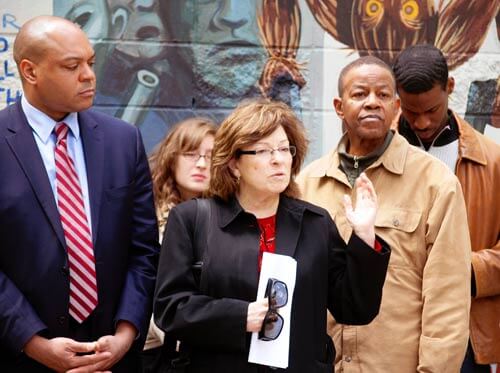Whether he came to it by way of routine political strategizing or he was personally moved to respond to some overwhelming spiritual or moral urging, President Obama’s remarks on the miscarriage of justice in Trayvon Martin’s death figure to be regarded, in historical perspective, as one of the highlights of his presidency. One senses that the president’s off-the-cuff talk in the White House briefing room the other day would have come off, for many if not most Americans, as a welcome enhancement to all the post-verdict dialogue and the understandable agitation among people of color. Not surprisingly, naturally, there have been, as well, the naysayer elements and worse.
On this side of the color divide, there’s been a bit of the “okay, as far as it goes” type of response, which is quite obviously not a majority view in this sector. Much of this tepid embrace of Obama’s performance was occasioned by his suggestion that perhaps within the political establishment isn’t where the population might want to turn for leadership in a “national conversation” on race. On the other side, middle-of-the-road indifference morphed, at the extremity where the one-note screamers abound, into the customary vitriol that painted Obama’s remarks as “race-baiting,” “reprehensible” and all the rest. So, what else is new?
In truth, the impromptu discourse by the president had lots to commend it. There has been much attention drawn to the president’s personalizing of the black male experience in what he had to say. Martin could have been his son, he said. Or, 35 years ago, he might have been Martin. Enumerating the obstacle-strewn path of the black male enlarged the graphic picture – references to crossing the street and hearing the sound of cars being locked; or entering an elevator and seeing white women clutch pocketbooks tightly until they exit. Obama’s willingness to identify with those everyday harsh realities of black life established a connection that, if nowhere else, had to have resonated exceedingly well with people of color.
There was another point the president made that must have given him a major boost as one standing tall (uncharacteristically, some might argue) in the African American camp. What if, he said, Trayvon Martin had been armed and had shot Zimmerman because he felt threatened? Would the Stand Your Ground law have worked equally in his favor? It’s a core question, the ignoring of which would make any and all of those much parroted national conversations on race exercises in futility.
There was no shortage of media commentary reflecting the outrage felt overwhelmingly, but not only, among people of color. In the Washington Post Eugene Robinson addressed the precariousness of the young black male’s position in society. He noted that “black boys in this country are not allowed to be children. They are assumed to be men and full of menace.” Eric Liu in Time magazine said: “Martin died not because he was wearing a hoodie but because he was wearing a hoodie while black. Blackness was the fatal variable.”Of course one could, if so inclined, also get a full serving of right-wing bilge, ladled out even after the verdict and continuing a disparagement of the murdered teenager as drug abuser, gang member and who-knows-what else. The fate suffered by Martin and acquittal of the man charged with his senseless murder are but one of the many flashpoints in the often sordid history of black-white intersecting in this country that has long demonstrated how much right wing zealotry is synonymous with racism.
The trial and verdict were seen, too, by some as a handy device for introducing the issue of black-on-black crime. No self-respecting person of color would want to deny the scourge of black-on-black crime and its ravaging ways in the black community. But in the matter of this 17-year-old being followed by a sheriff wannabe, the indications of racial profiling clear as crystal, talk of black-on-black crime is a three dollar bill oddity. It has no place here. Those conversations on race, when and if they come to be, must of necessity address head-on a plague with such decimating capacity for our black humanity. But the conversations must also summon the courage to expose for critical scrutiny what Time’s Eric Liu calls the “unearned privilege” of whiteness that allows a Zimmerman to walk after he proceeded to do what an official law enforcement person instructed him not to do.
The president held out hope that things are getting better, appearances to the contrary. And he cited his daughters as having given him much of that sense of progress being made. Others aren’t so sure and suggest that how the Obama youngsters interact with their friends might be too narrow a prism through which to gauge where we are on the racial interaction trajectory. The president may well be correct in figuring politicians not to be the best bet for bringing constructive movement to the conversations on race. Trouble is, there’s a whole mess of folks, not “accredited” members of the political class, who would match, stride for stride, the very entrenched ideological fervor and rigidity for which the president thinks political types should be off limits. The question, then, of who will talk to whom in those vaunted national conversations on race may just tamp down a bit Obama’s expectations of a rosier outlook not too far down the road.
























